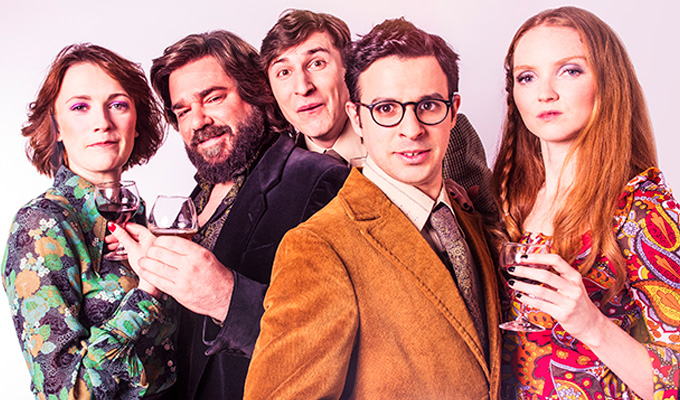 © Shaun Webb
© Shaun Webb We're high and mighty... and utterly degenerate
Meet the cast of West End play The Philanthropist
‘I am very nervous at this stage,’ says Simon Bird. As he as every right to be, given that we’re speaking just days before he makes his West End debut.
Known for the Inbetweeners and Friday Night Dinner, his previous stage acting experience is limited to a four-night run of The Crocodile at the Manchester International Festival. But here he is about to take the pivotal role in a 16-week run of The Philanthropist at Trafalgar Studios.
‘But I’m also very excited,’ he quickly adds, alert to the fact he should be selling the play. ‘What’s great is that I feel like I'm surrounded by such an amazing team so I feel that even if I’m a total disaster in it. the play is still going to be really good.’
That team is also relatively inexperienced in terms of West End profile. Matt Berry confesses: ‘This is something fairly new, especially a run as long as this. This is a proper West End run’; and Charlotte Ritchie, of Call The Midwife and Fresh Meat fame adds: ‘I haven’t done that much live stuff… but I’m in the posters now so I can’t leave.’
Of the other actors, Tom Rosenthal won acclaim in Chicken Soup With Barley at the Royal Court – but that was six years ago – and Lily Cole had a run in The Last Days of Troy two years ago.
But they do have the benefit of a VERY illustrious director to lead them through the revival of Christopher Hampton’s 1970 comedy. ‘I feel like I'm in Simon Callow’s acting school,’ Cole admits. And Ritchie says the acting titan knows her role so well that she jokes: ‘I wish I could put him in Celia’s dress and send him out instead of me.’
The play is set at a dinner party of Oxbridge academics, a bubble of witty intellectual grandstanding in isolation from a tumultuous world outside.
’It’s called a bourgeois comedy,’ Rosenthal explains. ‘There’s witty repartee when everyone’s trying to top each other. These are university dons who are always sparring.’
If the cast seem young for such roles, well that’s deliberate.
‘Christopher wrote it with the specific instructions that the cast should be between 25 and 35,’ Cole says. ‘But apparently this is the first production that has ever been played that age. People have tended to stage it older.
‘The reality is when I was at university a lot of lecturers are young, as they are graduates turned lecturers. In Christopher’s own words, when he wrote it he was so young, 23, that 35 seemed ancient to him.’
Callow pays tribute to the ‘fantastic youthful freshness’ of the play and adds: ‘Essentially, the characters are youngish and it appeal to me to do a play with some young actors, especially young comic actors, to create a different feel to the play

‘When it was first done it was done by marvellous actors like Alec McCowen, who was already in his mid 40s and Charles Grey - who played the part Matt’s playing – was 55. They were absolutely great but it was very much a play rather elegantly done by actors.’
In contrast, he says as he rehearses his version, ‘a comic, anarchic bubble is starting to rise’.
‘They are very fresh to the stage,’ he says of his cast. ‘Not very many have done much theatre and that has its own charm. It creates an exploratory feeling, discovering how it all works.
‘The fact the characters are at university is just the water in which they swim. What they are engaged in, which is what we are all engaged in, is trying to figure out their human relationships and how you handle all that - infidelity, non-commitment and so on. If Philip is in his late 40s it’s a very different story than if he’s in his 20s.’
Philip is Bird’s role – ‘a bit of an alien’, according to the comedian, who explains that he takes everything literally. ‘He doesn’t really understand the way people talk - cynicism or humour or irony. He’s very sincere and it’s about whether it’s possible to be sincere in the modern world. That’s one of the things the play is about.’
‘Philip is sort of the man of the play – Phil, Philanthropist,’ Ritchie adds. ‘Everybody else in the play enjoys being witty for the sake of being witty. Philip is very literal-minded and completely precise about everything.’
In return, Bird describes Ritchie’s character Celia – originally played by Jane Asher on Broadway – as ‘a sparkling wit. Everything she says is a bon mot – is it mow or mott?,’ he stops to ponder the pronunciation. ‘She floats around the set dropping zingers.She’s a very funny character and all the men are sort of in love with her in one way or another.’
Rosenthal’s character Don ‘symbolises sloth’, according to Cole, who tells her co-star: ‘I kinda feel you’re playing an old man in a young man’s body. The character has the energy of a 60-to-70-year old lecturer who has become quite lazy and lackadaisical.’
Rosenthal agrees: ’He’s quite eloquent by nature and I think he’s realised he can use that as a tool to con people that he has more substance than he has. He uses his verbal dexterity as a tool to make people like him. There is a slight insecurity to him but he’s mainly all show.
‘That’s quite interesting form a comedy point of view. There’s one character played by Matt Berry who’s a successful writer and Don probably has the talent and ability to be a successful author, too, but not the application so he has a real jealousy of Matt’s character that you might recognise from a certain few comedians who bitch about the other successful comedians.’
Rosenthal describes Cole’s character of Araminta– originally played by Penelope Wilton – as ‘quite highly sexed… slightly removed from the group and with a slightly otherworldly spirit that Lily captures perfectly with her otherworldly, large body.’
‘Where do yo get otherworldly from?’, Cole asks bemused but not offended at the description.
‘You are offbeat with the rest of the play. Aramintha is always one step ahead or one step behind the rest of the group; floating around this dinner party, slightly baseless.’
‘Bear in mind that Tom’s character really fancies my character so he has been coloured by those thoughts,’ Cole adds as a disclaimer.
And while Rosenthal is seeing comparisons with the comedy world, model-turned-actress Cole is being more erudite. ‘It reminds be a little bit of Buñuel,’ she said. ‘I don’t want to get too artsy-fartsy but he used to make movies in the 20th century that would take the piss out of the bougeoise by showing their moral hypocrisy. How they are often super self-righteous and feel like they are morally superior but at the same time are really base and have behaviour that’s morally questionable.
‘The play does that, in a way. It’s got all this high and mighty language and intellectual thinking but all the characters are all in different ways degenerate.’
She also said the jokes ‘aren’t obvious…. on paper it wasn’t obvious where the people were going to laugh. Reading it, it’s surprising.’
Rosenthal explains that Callow wants them to play it straighter. ‘A lot of us were reading it like a comedy, and in the rehearsal process Simon made us realise its a much better play if you’r not playing it all comedically. But I’m worried that the comedian in me will try to search a laugh, and he’ll say, "We don’t want one there".
As talk turns to stand-up Cole exclaims to Rosenthal in a combination of shock and awe: ‘You do stand-up by yourself!’
Would she ever give it a try? ‘My partner’s said a few times we should do it,’ she admits. ’But it seems like the most harrowing thing ever!’
Rosenthal admits it can be – bit that’s not stopping him working uo material for a new stand-up show for the 2018 Edinburgh Fringe, and even Bird – whose got waylaid from that path after his early successes with the Cambridge Footlights and at the Chortle Student Comedy Award when TV fame came calling – hasn’t ruled out a return to solo comedy.

‘I would love to do stand-up and I’ve written bits and pieces,’ he said. ‘After The Inbetweeners I had a sense that it would be quite difficult to do because people would be coming to see it expecting to hear catchphrases. But maybe at some point in the future….’
He’s also about to turn director with an adaptation of the graphic novel Days Of The Bagnold Summer. ‘What stand-up shares with directing is that you've control,’ he says.’Basically what it boils down to is that I’m a total control freak.’
When I suggest that means an ensemble theatre piece might not be the best project for him, he spins the question around to join the chorus singing the praises of Callow.
‘Simon Callow is the most intelligent person I've ever met,’ he gushes. ‘Everything he comes out with is spot-on and so illuminating in a totally unexpected way. He knows a lot about everything ad he knows loads about this play.
‘He’s friends with Christopher Hampton and has wanted to direct it ever since he saw the original in the first week in played in London. So he’s got a lot of opinions - that’s going to sound bad! He’s got a lot of opinions in a good way!’
* The Philanthropist starts at the Trafalgar Studios on Monday. Tickets here.
Published: 30 Mar 2017






